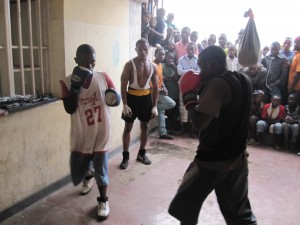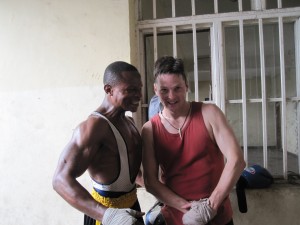Goma, Democratic Republic of Congo February 3rd 2011
 In 1961 when US writer George Plimpton stepped into the ring and sparred three rounds with then boxing champion Sugar Ray Robinson as part of an assignment for Sports Illustrated, he both made journalistic history and empowered millions to dream of living out their sporting hero fantasies.
In 1961 when US writer George Plimpton stepped into the ring and sparred three rounds with then boxing champion Sugar Ray Robinson as part of an assignment for Sports Illustrated, he both made journalistic history and empowered millions to dream of living out their sporting hero fantasies.
It is the second week into my training with the Democratic Republic of Congo’s champion boxer, Kibomango, in the last of the three rounds we have together this morning inside the Volcanoes Football Stadium in Goma, and I am discovering exactly what Plimpton did when he began his own everyman sporting journey: this is no place for amateurs.
Kibomango is floating in front of me: ducking and weaving away from the blows, including the best one two combination I can manage. My arms ache and I don’t know how much longer I’m going to last. But now and then he gives me something to hope for and stays in one place long enough for me to land some punches before delivering a light tap to my nose to remind me that this is real.
At this point I finally feel that I am getting some street-cred with the 20-30 kids who have gathered to watch this spectacle, and have been since 630 AM, recording my lumbering mistakes in keeping up with the rest of the class during the drills and foot work exercises, in muttered comments in which “muzungu” is the only word to stand out.
After an hour into it some of the boxers, kids really, are beginning to lag, after having completely outpaced me until now, and I realise that for some of them their last meal may be a distant memory. When one gets bleeding fists from having gone bare knuckle all morning I make a note to slip him enough Congolese Francs ($2) to buy hand wraps.
At the end we stop and, as always, put our fists together and shout our boxing chants:
“Je suis fort!”
“Je suis prêt!”
“J’ai esprit!”
This is followed by the Swahili chants, that I don’t yet fully understand, although one word, fittingly enough, is “Gonzo”.
 Kibomango signals that we are not finished. He wants me to jog with him and will accompany me all the way back across town to my hotel, which we do, keeping an easy loping pace and with our fists raised. This is a singular honour. I am basically parading through Goma with its foremost sporting hero and am getting turned heads the whole way. I feel it is almost declassé for Kibomango to be in my unworthy sporting company but no, after a week of professional teacher-student distance, he wants to know a bit more about me and even shares some of his story, including his fight record—17 and 1 with six knock outs, not counting the death—and ambitions to go all-Africa and even World Champion.
Kibomango signals that we are not finished. He wants me to jog with him and will accompany me all the way back across town to my hotel, which we do, keeping an easy loping pace and with our fists raised. This is a singular honour. I am basically parading through Goma with its foremost sporting hero and am getting turned heads the whole way. I feel it is almost declassé for Kibomango to be in my unworthy sporting company but no, after a week of professional teacher-student distance, he wants to know a bit more about me and even shares some of his story, including his fight record—17 and 1 with six knock outs, not counting the death—and ambitions to go all-Africa and even World Champion.
This man, from a very different world, a boxer from Congo’s slums with discipline and ambition aplenty but no other support—no trainer, manager or corporate sponsors and who is scraping along making a living as a street mechanic—is now my friend.
His story, like that of many people in this country of tragedy and dramatic upheaval, is more remarkable than he realises. Kibomango is a “kadoga” a former child soldier, forcibly recruited at age 14. He participated in the dramatic battles that toppled the rotten regime of the late dictator, Mobutu, and fought all the way to the capital, Kinshasa, through 1500km of jungle, with the rebel forces of Laurent Kabila who, backed by Rwanda and Uganda, was installed as president in 1996. When the new Congolese government disappointed its former allies two years later he was present in the failed putch to topple Kabila in 1998 during which thousands were killed in days of street fighting in Kinshasa. His side would have succeeded and Kabila’s reign ended, but for the intervention of forces from Angola, Zimbabwe, Namibia and Chad, ushering in the start of the second Congo war, or what has been called Africa’s First World War, as well as all the horrors that have followed. What I had taken to be scars from professional boxing, including his missing eye and mangled nose, are war wounds—shrapnel from aerial bombardment in the epochal battle of Kitoma outside Kinshasa when the intervention of Zimbabwean and Angolan air power tipped the military balance and ensured Kabila’s survival. My teacher really is a fighter.

Tu a l’esprit c’est vrai mon pot. Attacké!
“Happiness requires something to do, something to love, and something to hope for.”
Swahilli proverb
Douglas:
It’s an amazing and moving story, something worthy of a documentary, which I suppose is exactly what you’re doing.
Boxing is an extraordinary pursuit, and I sometimes wonder ( in a North American context) if it’s more dangerous than actual war. It is likely blasphemy to type those words, but last night after watching the documentary Facing Ali, and seeing all of the men–almost all black and from acutely disadvantaged backgrounds–20 years after their glory days, was sobering. They were physical wrecks, all needing subtitles, all once again in a state of poverty and distress. They, too, the survivors, were the walking wounded, their stories heroic, brutal and unfair, so similar to the wonderful stories you tell from the Congo.
Yes, it is a remarkable story, as is my teacher, Kibomango, who is such a righteous man. Very patient, very skilled as a trainer. After boxing today we went to the largest store in Goma together and bought some equipment for his class.
I also had my first live fight today. Felt pretty scared when the gloves were being put on.